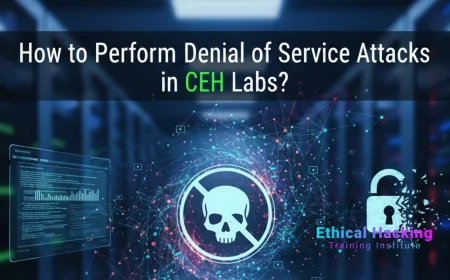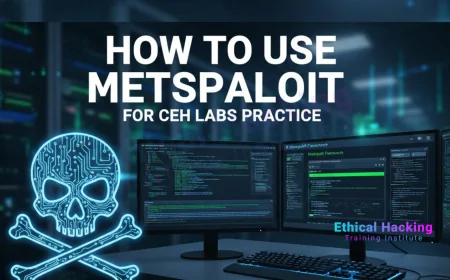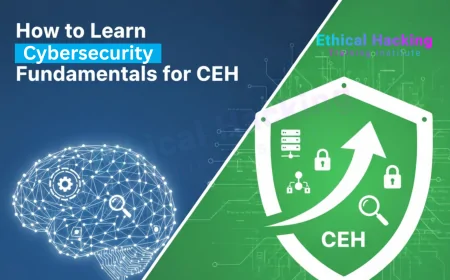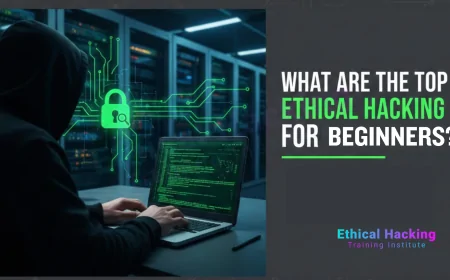What Is the Best VAPT Course for Beginners? Step-by-Step Guide to Start Your Cybersecurity Career
Looking to start your career in cybersecurity? A VAPT (Vulnerability Assessment and Penetration Testing) course for beginners is the perfect gateway. This detailed blog explains what VAPT is, why it's important, who it's for, and the exact steps to begin your journey. Learn about the tools, skills, certifications, and job opportunities associated with VAPT, along with practical tips to succeed. Whether you’re a student or career switcher, this guide helps you confidently take the first step toward becoming an ethical hacker.
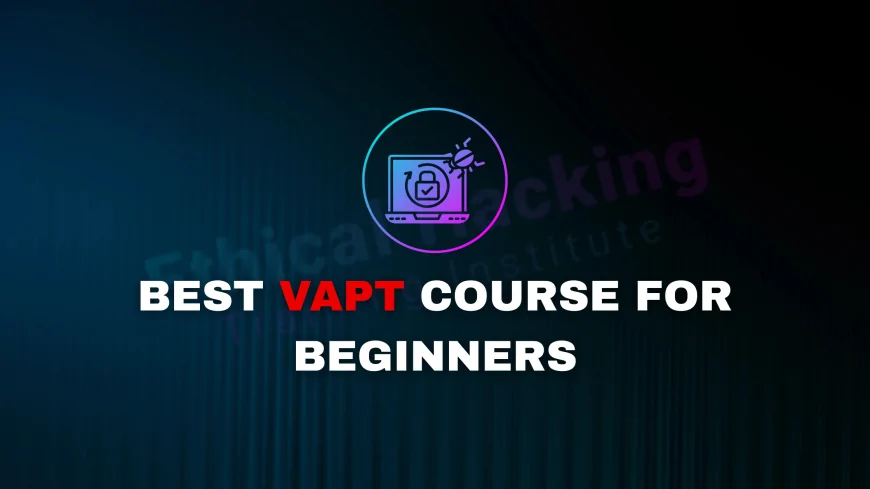
Table of Contents
- What is VAPT and Why Is It Important in Cybersecurity?
- Who Should Take a VAPT Course?
- Why Beginners Should Consider a VAPT Course First
- Skills You’ll Learn in a Beginner VAPT Course
- Typical Structure of a Beginner VAPT Course
- Tools You’ll Master in a VAPT Course
- Certifications You Can Aim for After VAPT
- Career Opportunities After Completing VAPT Training
- How to Choose the Right VAPT Course for Beginners
- Tips for Success in Your First VAPT Course
- Conclusion
- Frequently Asked Questions (FAQs)
Vulnerability Assessment and Penetration Testing (VAPT) is one of the fastest-growing domains in cybersecurity. For beginners aspiring to build a solid career in ethical hacking, enrolling in a VAPT course is an ideal starting point. This blog breaks down the essentials of VAPT training, who it's for, what to expect, and how it can kickstart your journey into the world of cybersecurity.
What is VAPT and Why Is It Important in Cybersecurity?
VAPT, or Vulnerability Assessment and Penetration Testing, is a systematic process of identifying and exploiting security weaknesses in networks, systems, and applications. The goal is to discover vulnerabilities before malicious hackers can find and exploit them.
Key Importance:
-
Helps organizations identify and patch security holes.
-
Ensures compliance with regulatory requirements (e.g., ISO 27001, GDPR).
-
Enhances the overall security posture of systems and networks.
-
Builds practical skills for cybersecurity professionals.
Who Should Take a VAPT Course?
A VAPT course for beginners is ideal for:
-
Students and graduates of computer science, IT, or engineering.
-
Aspiring ethical hackers or cybersecurity professionals.
-
System/network administrators seeking to advance their skills.
-
Anyone passionate about information security and hacking ethically.
Why Beginners Should Consider a VAPT Course First
For those new to cybersecurity, starting with VAPT provides a strong practical foundation:
-
Learn real-world hacking tools and techniques.
-
Understand common vulnerabilities and how to exploit them ethically.
-
Gain hands-on experience through labs and simulated environments.
Skills You’ll Learn in a Beginner VAPT Course
| Skill Area | Description |
|---|---|
| Networking Basics | Understand IPs, protocols, firewalls, and subnets. |
| Linux Fundamentals | Operate Linux systems, file permissions, and commands. |
| Information Gathering | Footprinting and reconnaissance using tools like Nmap and Whois. |
| Vulnerability Scanning | Use tools like Nessus, OpenVAS, Nikto for detecting weaknesses. |
| Exploitation Techniques | Learn manual and automated exploit methods. |
| Web App Security | Test and secure web apps from SQLi, XSS, CSRF, etc. |
| Penetration Testing Tools | Master tools like Metasploit, Burp Suite, Wireshark. |
| Reporting | Create professional vulnerability and pentest reports. |
Typical Structure of a Beginner VAPT Course
-
Introduction to Cybersecurity & VAPT
-
Networking & Linux Essentials
-
Reconnaissance and Footprinting
-
Scanning and Enumeration
-
Vulnerability Analysis
-
System Hacking and Exploitation
-
Web Application Attacks
-
Post-Exploitation Techniques
-
Penetration Testing Reports
-
Live Projects & Capstone Assessments
Tools You’ll Master in a VAPT Course
| Category | Tools Covered |
|---|---|
| Scanning Tools | Nmap, Nessus, OpenVAS |
| Exploitation Frameworks | Metasploit, SQLMap |
| Web Testing Tools | Burp Suite, OWASP ZAP, Nikto |
| Sniffing & Spoofing | Wireshark, Ettercap |
| Password Cracking | John the Ripper, Hydra, Hashcat |
| Reporting & Automation | Dradis, Serpico, Bash/Python scripting |
Certifications You Can Aim for After VAPT
After completing a beginner VAPT course, you can aim for advanced certifications:
-
OSCP (Offensive Security Certified Professional)
-
CEH (Certified Ethical Hacker)
-
CompTIA PenTest+
-
eJPT (eLearnSecurity Junior Penetration Tester)
These credentials boost your resume and increase job opportunities in cybersecurity.
Career Opportunities After Completing VAPT Training
| Job Role | Average Salary (INR) |
|---|---|
| Security Analyst | ₹4,00,000 – ₹8,00,000 |
| Penetration Tester | ₹5,00,000 – ₹10,00,000 |
| SOC Analyst | ₹3,50,000 – ₹7,00,000 |
| Ethical Hacker | ₹6,00,000 – ₹12,00,000 |
| Vulnerability Analyst | ₹4,50,000 – ₹9,00,000 |
| Cybersecurity Consultant | ₹7,00,000 – ₹15,00,000 |
How to Choose the Right VAPT Course for Beginners
When selecting a course, ensure it offers:
-
Hands-on labs and real-world projects
-
Industry-recognized certification
-
Expert mentors with experience
-
Live classes and flexible learning options
-
Interview prep and career assistance
Institutes like Ethical Hacking Training Institute provide comprehensive VAPT courses tailored for beginners, complete with hands-on training, mentorship, and placement assistance.
Tips for Success in Your First VAPT Course
-
Start with networking and Linux basics.
-
Practice daily on labs or online platforms like TryHackMe or Hack The Box.
-
Document everything you learn — it helps in report writing.
-
Engage in community forums and peer discussions.
-
Don’t rush — master each topic before moving to the next.
Conclusion: Why VAPT Is the Smart Choice for Beginners
A VAPT course for beginners is the perfect launchpad into cybersecurity. It offers a balanced mix of theoretical knowledge and practical skills, opening doors to high-demand ethical hacking careers. Whether you're a student or a tech enthusiast, VAPT can fast-track your journey into the exciting world of ethical hacking and digital defense.
FAQs:
What is a VAPT course for beginners?
A VAPT course for beginners teaches students how to identify and exploit system vulnerabilities using real-world ethical hacking tools and methods.
Who should take a beginner-level VAPT course?
It is ideal for students, IT graduates, aspiring ethical hackers, and those starting a career in cybersecurity.
Do I need programming skills to start a VAPT course?
No, most beginner VAPT courses don’t require prior coding experience but teach basics like scripting during the training.
What skills are taught in a beginner VAPT course?
Skills include networking, Linux fundamentals, scanning, enumeration, web application attacks, and penetration testing.
Is VAPT course suitable for absolute beginners in tech?
Yes, many VAPT courses are designed to be beginner-friendly with foundational content and hands-on labs.
What are the career opportunities after a VAPT course?
You can work as a security analyst, penetration tester, SOC analyst, or ethical hacker.
What tools will I learn in a VAPT course?
You’ll use tools like Nmap, Nessus, Metasploit, Burp Suite, Wireshark, and more.
Is VAPT certification necessary for a cybersecurity job?
While not mandatory, certification boosts your credibility and helps in securing entry-level cybersecurity roles.
How long does it take to complete a VAPT course?
Most beginner courses take 2–3 months depending on learning pace and course format.
Is the VAPT course theory-based or practical?
It includes both but emphasizes practical hands-on labs and simulations.
Can students apply for VAPT training while in college?
Yes, students can start learning VAPT during college to build an early cybersecurity career.
Which certification is best after VAPT for career growth?
After VAPT, certifications like CEH, OSCP, and eJPT can further boost your profile.
What’s the difference between VAPT and ethical hacking?
VAPT is a subset of ethical hacking focused on vulnerability scanning and testing security defenses.
What is the cost of a beginner VAPT course?
Course fees vary but typically range from ₹10,000 to ₹35,000 depending on duration and training institute.
Can I get a job after just a VAPT course?
Yes, many entry-level cybersecurity roles are open to candidates with VAPT training and practical skills.
What makes a VAPT course beginner-friendly?
Simplified explanations, real-life examples, guided labs, and no prerequisites make it beginner-friendly.
Does the course include reporting training?
Yes, you’ll learn how to create professional vulnerability assessment and penetration test reports.
What is the average salary after completing VAPT training?
Entry-level roles offer ₹3.5 – ₹6 LPA, increasing with experience and certifications.
Can I learn VAPT online?
Yes, many reputable institutes offer beginner VAPT courses in online mode with live classes and labs.
Is VAPT legal to learn and practice?
Yes, as long as you're using the knowledge ethically and within legal boundaries.
What learning platforms are good for VAPT practice?
Platforms like TryHackMe, Hack The Box, and Cyber Range Labs are great for practice.
What’s the first thing to learn in VAPT?
Start with networking fundamentals and Linux basics to build a strong technical foundation.
Does VAPT training help in cracking CEH or OSCP?
Yes, VAPT gives you hands-on skills that align with CEH and OSCP exam requirements.
Can non-technical students learn VAPT?
Yes, with interest and consistent practice, non-technical learners can succeed in VAPT.
How often should I update my VAPT skills?
Cybersecurity evolves fast, so continual learning and tool updates are essential.
What are common topics in a VAPT syllabus?
Topics include reconnaissance, scanning, vulnerability analysis, exploitation, and reporting.
Is there job placement after a VAPT course?
Many institutes offer placement support, resume building, and interview preparation.
What industries hire VAPT professionals?
IT services, banking, e-commerce, government, healthcare, and telecom are major employers.
Are there weekend VAPT courses for working professionals?
Yes, many training providers offer weekend or evening batches for working individuals.
Can I use VAPT skills for freelance cybersecurity work?
Absolutely! VAPT skills are valuable for bug bounty hunting and freelance pentesting projects.
What's Your Reaction?
 Like
0
Like
0
 Dislike
0
Dislike
0
 Love
0
Love
0
 Funny
0
Funny
0
 Angry
0
Angry
0
 Sad
0
Sad
0
 Wow
0
Wow
0







